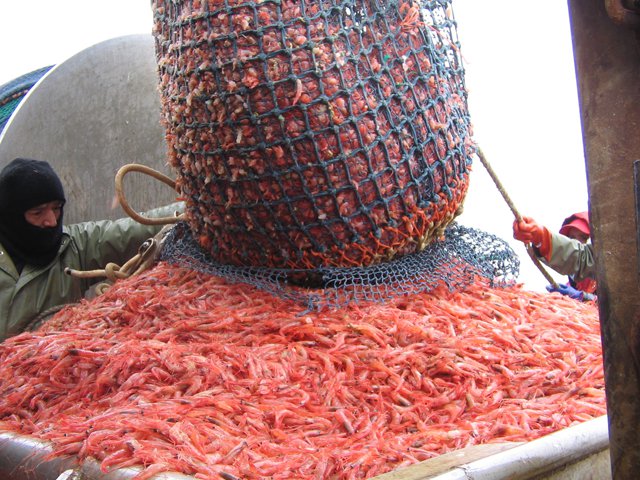In 1969, New England fishermen, mostly Mainers, landed 24 million pounds of shrimp, the most ever. Anyone with anything that would float rigged it to go shrimping. Some of these vessels were skippered by guys whose only prior sea time was on surfboards.
Indeed, there was no question in my mind, as I stared blankly at the classroom walls my junior year of high school, that college would be a complete and utter waste of time and that the moment I graduated, one year hence, I needed to get my scrawny hind parts down to the dock and get on a boat.
Those were the days! Last winter, the so-called quota was a research set-aside of 48,500 pounds split among a handful of shrimp trawlers and trappers.
Scientists are recommending the fishery remain closed this year.
In my view, arguments in favor of closing shrimping in the Gulf of Maine are based more on idealism than on common sense.
Fishery management is not about overseeing biomasses of fish, or even cultivating them. By definition, it is about deriving the maximum benefit from the resource. It’s not a fishery unless there’s a harvest.
The No. 1 argument against shrimping seems to be that a warming ocean is less hospitable to Pandalus borealis. In which case, it seems probable they will shift toward cooler waters. Why not catch them while they are still here?
The No. 2 argument, potentially a corollary of the first, is that landings continue to decline. But assessing stocks by tracking landings is walking down the garden path. As Ray Hilborn of the University of Washington has pointed out, if quotas are ratcheting down, landings can hardly rise.
Management should be about the operation of fisheries: how much we catch, and how and when we catch them. A regime of zero landings over several years does not equate to management because the fishery isn’t operating. Moreover, it perpetuates the demonstrably bankrupt notion that it is in fishermen’s interest to not fish today because tomorrow will be better.
New Englanders have learned, as my mother used to say, that tomorrow never comes.
That’s not to say no fishery should ever close. If there is no economic benefit to be derived from a fishery then, by all means, close it.
,However, when it comes to Gulf of Maine shrimp we should be particularly resistant to prophecies of doom. They show up every 20 years or so and peter out after a few seasons, regardless. We’ve managed them and we’ve hammered them but the cycle is always the same.
In the early 1970s, we did what we could to wipe them out, including towing on them all summer. The catch wasn’t high and the quality was poor – the shrimp were sold “on recovery,” and we got raked another 10 percent on top of that – but we caught hake with them and could eke out a living until things picked up in late fall.
The Gulf of Maine has never been the primary shrimp habitat in the northwest Atlantic. This season, the quota for the waters off Newfoundland and Labrador, the epicenter of the shrimp biomass, is 27,825 metric tons (more than 61,000,000 pounds). Newfies consider this allotment an insult, and it is indeed a substantial reduction from their quota a year earlier.
It is also two and a half times what we caught in 1969.







